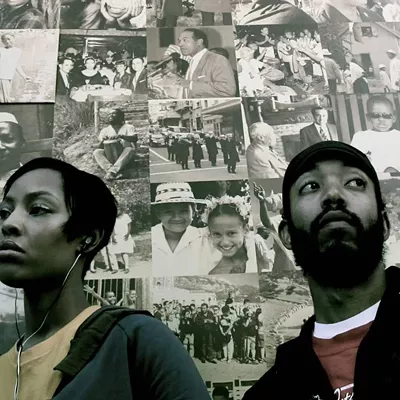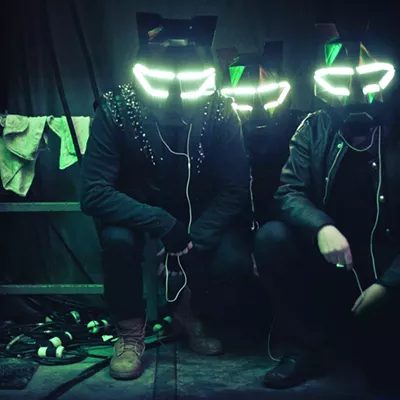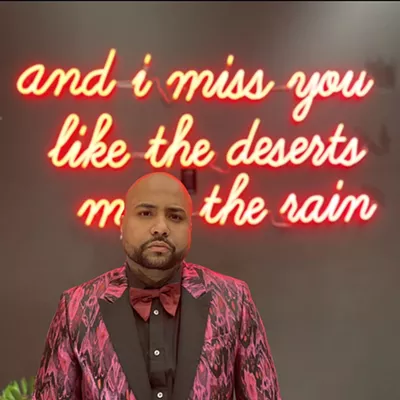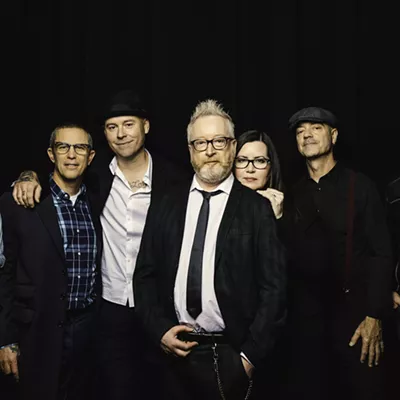People compare Parker's work to that of Neil Young, even though they sound nothing alike, aside from the fact that you could call them both "earnest" or "earthy" or some such nonsense, and they both split their time between gentle acoustic songs and fuzzy, ragged-guitar rockers. Oh, but there's also this: Both are fantastic songwriters who tend to paint in broad strokes.
With his catalog of no-frills songs, each one marked with a gorgeous melody, Parker has also done something fairly remarkable in a career that now stretches along nine years, three record labels, five full-length albums and two EPs: He has never released a crappy record.
Parker began his musical life in his native Poughkeepsie, N.Y., by learning to play drums while in middle school, but he eventually picked up the guitar in his early high school years. From the start, he realized he wasn't content to merely learn other people's songs. "I was always interested in making original music, you know, even when I first started playing drums," he says. As a student at a nearby college in Newpulse, he became friends with a group of fellow musicians, many of whom attended Vassar, which he says was "just across the river." One of which was Jud Ehrbar, who would prove to be a longtime collaborator and lifelong friend. The pair even drove from New York to Alaska one summer, hauling their equipment along. "We worked in a cannery and then played on the weekends," he explains. "We had a regular gig at this place up there, and we played all sorts of weird places; we played at the cannery and at campsites."
Not long after that trip, Parker relocated to Portland, Ore., while Ehrbar settled in Providence, R.I. In Portland, Parker recorded a solo album on which he played every instrument, on a four-track recorder. It was released as Man of Sin, under the moniker Varnaline, on Zero Hour in 1996. Just prior to that, in 1995, the same label released Voyager, the debut of Ehrbar's project with his friend Jeff Gatland, which bore the name Space Needle. Soon, Parker moved back East to make music with Ehrbar once again. "It was kind of this thing where he wanted an extra person for the (Space Needle) touring band," he recounts, "and I was like, 'Well, I'll come back and do that if you play drums in Varnaline.' And it kind of all went from there."
What started out as a one-man project had become a full-on band, and the second, self-titled Varnaline album reflected that. "It changed pretty radically from the first record to the second record," says Parker, "just because as a live band, we were pretty heavy. There was kind of a lot of frenetic energy there; we were a pretty loud and fast kind of band at certain points, but there was still some kind of mellow stuff in there."
And Parker didn't stop there with the idea of changing things up with each new release. He tidily sums up the Varnaline oeuvre thusly: "I guess all the Varnaline records are pretty different. The first one's just kind of me on a four-track. And then the second one, we did in a proper studio as the full band. Then I did A Shot and a Beer, which was kind of like an acoustic EP that I did all by myself. And then Sweet Life was kind of a full-on production; I was trying to make this kind of pastoral acoustic pop record, for lack of a better description, and that was done with a full band; John Agnello produced it. And then the last one, Songs in a Northern Key, was kind of back to just being me again. I kind of tried to make this long suite of songs all sewed together in this kind of semi-psychedelic sunburned haze of something--I don't know exactly what. But I wanted everything to be woven together. They're all my songs, but each record kind of has its distinct vibe, which is what I was going for."
You may have noticed that Parker above refers to Songs in a Northern Key (released on Steve Earle's E-Squared label, a division of Artemis, in 2001, after Zero Hour went belly-up; Parker has since re-released the Zero Hour records on his own Cloud imprint) as "the last one," but that's a bit misleading. While it was indeed the last Varnaline record, last year Parker issued Tell It to the Dust (Baryon) as the first release under his own name. He explains, "I guess I've been doing a lot of solo touring the last number of years, and it just seemed to make sense because it got confusing, I think. When I would go out and play by myself, I wouldn't play under the Varnaline name; I played under Anders Parker. And I just wanted a change. I felt like the Varnaline name was what it was. Even when I made Songs in a Northern Key, I really wasn't sure what the future was gonna hold, but I kind of felt like it was time to leave that behind."
Even so, Tell It to the Dust isn't much of a departure from the Varnaline albums, which, as varied as they may be, all share certain qualities: Parker's knack for haunting, lovely melodies and his so-warm-it's-downright-comforting voice. And, though he's incorporated elements such as strings, a blues harp and sax in spots on Tell It ..., the songs on the album, like those on the Varnaline releases, have a tendency to feel like they are already etched in your mind, even as they're unfolding before you--a quality that renders them timeless.
The same sessions that produced Tell It to the Dust also yielded The Wounded Astronaut, a six-song EP that was released on Baryon in March. "I knew pretty much what was going to be on (Tell It to the Dust)," he explains, "but I also wanted to leave it open because, sometimes in the context of a record, certain songs may fit better that aren't necessarily, well, I don't want to say somebody's favorite, but it's like putting a puzzle together. There are songs on the EP that I'm really proud of, but they just didn't fit, to me, in the record."
In fact, the songs on The Wounded Astronaut on a par with those on Tell It to the Dust, or, for that matter, any of the Varnaline albums. Like I said earlier, the guy just seems incapable of making a bad record.










